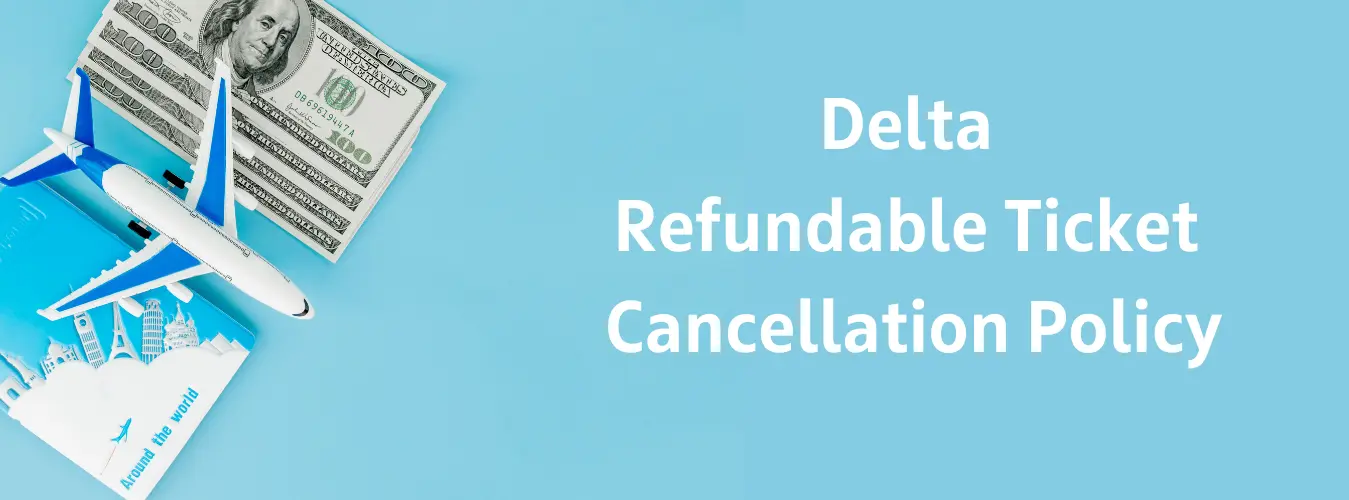
Delta's refundable ticket cancellation policy allows passengers to cancel their flight and receive a full refund, including any taxes and fees paid, if they cancel within 24 hours of booking and at least 7 days before the scheduled departure time.
If the cancellation is made after the 24-hour window or within 7 days of the scheduled departure time, the passenger may still be eligible for a refund, but a cancellation fee and other restrictions will likely apply.
Before purchasing a refundable ticket, customers should understand Delta's refundable ticket cancellation policy because it can affect their decision-making process and financial planning. For example, if a traveler is unclear about their trip intentions, a refundable ticket may be a better option; nevertheless, they must be aware of the cancellation clause to avoid any unexpected fees or restrictions. Similarly, if a passenger needs to cancel their trip, knowing the policy might assist them to decide when to cancel and minimize their financial loss.
A refundable ticket is a ticket that allows the passenger to cancel their flight and obtain a full refund, including any taxes and fees, without incurring any additional fees or penalties. Refundable tickets are often more expensive than non-refundable tickets, but they provide greater flexibility and peace of mind.
The benefits of purchasing a refundable ticket include:
Flexibility: Refundable tickets allow passengers to change their travel plans without fear of losing their money. They can cancel or modify their flight without incurring additional fees or penalties if they do so within the cancellation window.
Peace of mind: Refundable tickets give travelers who are unclear about their travel goals peace of mind. They can plan their flight far in advance and make changes or cancel their vacation without fear of financial loss.
Convenience: In general, refundable tickets are more convenient than non-refundable tickets. Passengers can make modifications or cancel their trip over the phone without going through a lengthy process.
Non-refundable tickets, on the other hand, are less expensive but subject to more restrictions. Non-refundable tickets are usually subject to a cancellation fee and other restrictions that limit the passenger's ability to change or cancel their flight. Some non-refundable tickets, for example, may only allow for fee-based changes or cancellations, or may only be valid for a limited time. As a result, customers who get non-refundable tickets must be more certain about their travel plans and are often less flexible when it comes to changing them.
Delta's refundable ticket cancellation policy allows travelers to cancel their flight and receive a full refund, including any taxes and fees, if the cancellation is made within 24 hours of booking and at least 7 days before the scheduled departure time. Passengers can cancel their flight by phone at +1-332-699-4898.
If the cancellation is made after the 24-hour window or within 7 days of the scheduled departure time, the passenger may still be eligible for a refund, but a cancellation fee and other restrictions will likely apply. The actual cancellation cost and restrictions vary by fare class and destination but can range from $0 to several hundred dollars. Furthermore, certain fares may be subject to change.
It should be noted that if the traveler changes their flight rather than cancels it, they may be charged a change fee in addition to any applicable fare differences. Passengers should review the fare rules for their specific ticket to learn about any fines or restrictions that may apply to modifications or cancellations.
Delta usually issues refunds within 7-10 business days, but this can vary based on the payment type and bank processing times. Refunds are usually delivered in the same mode of payment that was used to make the original purchase, and they may be subject to additional processing fees or taxes.
Delta may waive cancellation fees in certain situations, such as:
Medical emergencies: If a passenger or a member of their immediate family is unable to travel due to a medical emergency, Delta may waive the cancellation fee and offer a refund or a change without any fee.
Military deployment: If a traveler is a member of the military and receives a summons to active service or a temporary duty assignment, Delta may waive the cancellation fee and offer a refund or a free change.
Bereavement: If a passenger's immediate family member dies, Delta may eliminate the cancellation fee and offer a refund or a modification without charge.
Flight cancellation or delay: If Delta cancels or delays a flight due to unforeseen circumstances such as extreme weather, travelers may be entitled to a refund or a free change.
In short, Delta offers refundable tickets, which allow travelers to cancel their flight and receive a full refund of the amount paid, including any taxes and fees, as long as the cancellation is made within 24 hours of purchasing and at least 7 days before the scheduled departure time. If the cancellation is submitted after 24 hours or within 7 days of the scheduled departure time, the passenger may still be eligible for a refund, but a cancellation fee and other restrictions may apply.
Passengers who have purchased a refundable Delta ticket should carefully read the terms and conditions and understand the cancellation policy to ensure they are aware of any penalties or restrictions related to canceling or changing their trip. They should also think about getting Delta Airlines travel insurance to protect themselves from last-minute adjustments or cancellations.
Overall, purchasing a refundable Delta ticket might provide peace of mind and flexibility if travel plans change. Refundable tickets, on the other hand, can be more expensive than non-refundable tickets and are not necessarily the most cost-effective alternative. Before purchasing a ticket, customers should carefully consider the benefits and expenses of each option, just as they would with any other travel decision.
Frequently Asked Questions (FAQs)